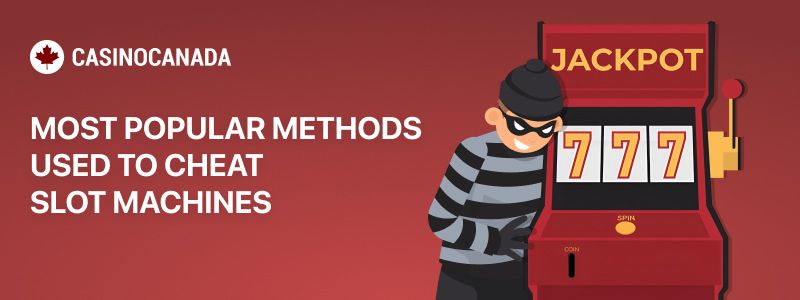10 Common Methods Used to Cheat Slot Machines

Casino players have debated for decades how to cheat at slots. However, because of random number generator (RNG) algorithms and security measures at casinos, cheating slots is nearly impossible. While it's unlikely to manipulate with the slot machine mechanics at online casinos, some cheaters have attempted various methods to deceive slots at land-based casinos. We’ve prepared an overview of all the ways devious players try to cheat slot machines.
1. The Coin on a String (Yo-Yo)
If you played with a yo-yo, you know it spins up and down if you control it accurately. That's precisely what happens with a coin attached to a yo-yo string. First, it is inserted into the slot machine deep enough for the machine to register it and start the game. Then, it is pulled out and used again and again.
This method is very similar to counterfeit coins but eliminates the need for large-scale production. Anyone can try to fool the casino with a coin on a string. However, modern casinos protect their slots with optical sensors, making this scheme useless.
2. Cheat Codes
Not always the incentive to cheat at slots comes from players. Ronald Dale Harris, a slot engineer who worked for the Nevada Gaming Commission, used his knowledge to make extra income from slots. As he was aware of the slot source code, he was able to manipulate the outcome of slot games.
He was caught when his partner in crime won a whopping $100,000 in a keno game back in 1995.
3. Shaved coins
In the early days of slot machines, players tried to cheat by shaving coins. The purpose was to make them thinner than their standard size. The slot machines wouldn’t recognize the tampered coin as a valid currency. Sometimes, the machine could be tricked into causing a malfunction in favour of the player or accepting the coin without triggering a payout.
For a short while, this was an effective slot cheating method. However, it doesn't work on modern slots. They are sensitive to coin size and shape. Besides, many have incorporated bill acceptors and card systems, making coins less relevant in slot machines today.
4. Fake coins
Indeed, there was a time when casino players tried using fake coins to manipulate slot machines. They were masterfully crafted to look like real coins. Fraudsters used materials and designs that slots couldn’t detect as counterfeit.
In recent times, slots have incorporated sophisticated coin validation mechanisms that automatically detect faulty coins. Therefore, using fake coins doesn't work anymore.
5. Magnet
Some casino con artists used magnets to control slots. They placed a strong magnet as near as possible to the slot's internal parts. This allowed them to stop the reels from spinning and control the outcome of the spins.
Nowadays, the technology has become more advanced. Slot machines use magnetic fields to protect from interference with magnets. Additionally, most slots are designed to function electronically, making cheating with magnets ineffective.
6. Computer chip replacement
A famous American casino fraudster, Dennis Nikrash, once learned how to reprogram a slot machine's chip. He bought a slot machine to play at home, and Nikrash realized that he could reprogram the chip, manipulating the game's outcome.
Dennis ordered many chips and reprogrammed them to install in the casino slots. Thus, he managed to run a successful operation that made him rich. Obviously, he was arrested later, and six years later, he died. Nowadays, such a cheating method is impossible due to the many security cameras and encoders installed in offline casino device programs.
7. Monkey Paw
Monkey Paw is a simple invention that triggers the slot to dispense a payout. Its creator, Tommy Glenn Carmichael, made it from a guitar string with a bent metal rod attached to it. The player had to insert this “device” into the coin slot to trigger a payout.
This was commonly used in the 1980s and 1990s. As with all early cheating methods, modern slots are equipped with technology to prevent tampering; therefore, monkey paws are no longer effective.
8. Light Wand
A more advanced device used for cheating at slots was a light wand. It was made to manipulate the slot machine's sensors. The wand produced a light beam that tricked the slot's sensors into registering that particular actions had occurred, such as a coin being inserted or a reel spinning having stopped, although, in reality, it hadn't.
Slot machines now have infrared sensors and detection systems to prevent interference with light wands. These systems detect all deviations from the machine's regular operations, making light wands useless for cheating slots.
9. Bill Validator Device
Another method that no longer works for tampering with slots is bill validator devices. These devices were used to bypass slot machine currency validation systems, making the slot accept counterfeit bills.
As electronic ticketing systems became more widespread, this method quickly became irrelevant. Also, with digital wallets and new and advanced currency validation technology, bill validator devices are now ineffective.
10. Top and Bottom Joint
A popular scam in the 1970s and 1980s was a top-and-bottom joint cheat. The fraud was performed with a unique tool consisting of two parts. The top was a metal rod, and the bottom – was a long wire. The player had to put the wire in the coin chute while the rod into the coin slot. As the slot was malfunctioning, the scammer was able to release all the coins that the slot was storing.
It worked well on the old-school slots, but modern security measures have made this tool and method obsolete.
Cheating at Online Slot Machines
If you are offered to buy a unique code or to pay for a win-win strategy to cheat electronic online slot machines, we suggest refusing. You'll be wasting your money, and here is why:
- A hacker who discovers a vulnerability would find it more profitable to use it personally rather than sell the secret
- Casino security will detect a software hack swiftly, preventing any potential profit
Any online slot, as well as offline devices, operates due to advanced software. Well-known game software developers, such as Playtech, Games Global (formerly Microgaming) and others, provide reliable script protection against hacking. Therefore, even casino owners can not "spin" slot machines, reducing the percentage of payments. Attempts to crack the game software have always been prevented. Therefore, players looking to cheat online slots should seek legitimate ways to earn money.










